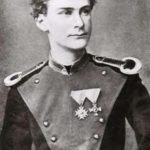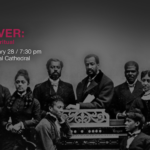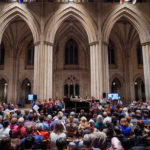In the current issue the quarterly review Raritan, I write that Mark Twain’s Adventures of Huckleberry Finn and Charles Ives’s Symphony No. 2 “are twin American cultural landmarks, comparable in method and achievement.” They both transform a hallowed Old World genre – the novel, the symphony -- through recourse to New World vernacular speech. To read the whole piece, … [Read more...] about Mark Twain, Charles Ives, and Race
Uncategorized
Did Wagner Exploit King Ludwig?
Did Wagner exploit King Ludwig? In Luchino Visconti’s magnificent four-hour film Ludwig, the king is ingeniously cast as an embodiment of the Wagnerian pariah; Visconti has transformed Ludwig’s story into a veritable homage to Richard Wagner. Is Visconti’s Ludwig a credible re-enactment of history? Doubtless it could be considered a whitewash job. But not be me. Wagner … [Read more...] about Did Wagner Exploit King Ludwig?
Dvorak, Harry Burleigh, and Cultural Appropriation — a “PostClassical” Podcast
Could Harry Burleigh -- Antonin Dvorak’s African-American assistant -- be considered an Uncle Tom? These days, the question comes up whenever Burleigh comes up: it’s a symptom of the times, and of our crazy obsession with “cultural appropriation.” And it is addressed head-on over the course of the most recent PostClassical Ensemble WWFM podcast, featuring a supreme … [Read more...] about Dvorak, Harry Burleigh, and Cultural Appropriation — a “PostClassical” Podcast
Lou Harrison and The Great American Piano Concerto — Reprised
Eight years ago, on the occasion of PostClassical Ensemble’s first performance of Lou Harrison’s Piano Concerto with Benjamin Pasternack as soloist, I wrote in this space: “The music of Lou Harrison represents a rare opportunity for advocacy. To begin with, he is unquestionably a major late 20th-century composer, and yet little-known. Also, he is both highly accessible and … [Read more...] about Lou Harrison and The Great American Piano Concerto — Reprised
Falla and Flamenco — “The Birth of Spanish Music”
According to my friend the remarkably loquacious Spanish pianist Pedro Carboné, the “birth of Spanish music” occurs during the third of Manuel de Falla’s Nights in the Gardens of Spain. Pedro made this argument at length on our most recent “PostClassical” broadcast: “Falla and Flamenco.” And he clinched it by citing his distinctive live performance of this piece with … [Read more...] about Falla and Flamenco — “The Birth of Spanish Music”




